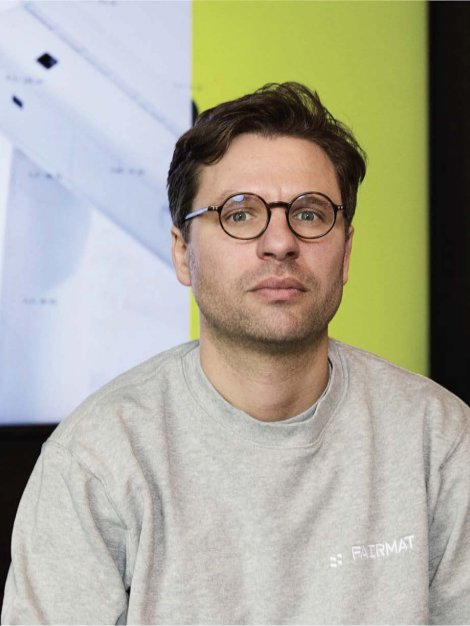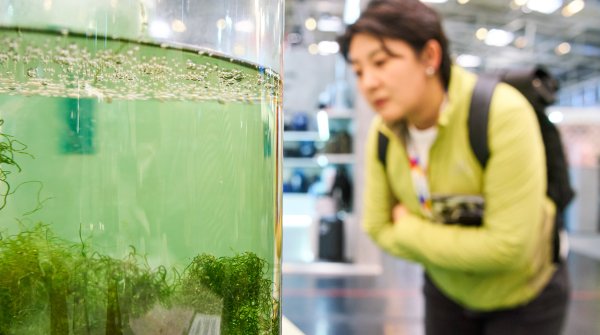Then subscribe to our forever-free newsletter for your competitive advantage.
- Your background and favorite outdoor sport?
- What challenge made you want to change the industry?
- How do you challenge your objectives?
- Your vision on European ESPR/DPP regulations?
- How do you translate regulations into action?
- Your vision of European Zero Impact 2030 project?
- Which partnership has most challenged your assumptions?
- What shift in materials or production will disrupt the outdoor industry?
Fairmat is a French tech company founded in 2020. They specialize in recycling carbon fiber composites and in designing second-generation materials from recycled carbon fiber waste. Fairmat’s approach emphasizes recycling processes that emit less CO2. Producing new materials & avoiding traditional methods like incineration, we met Benjamin Saada Fairmat’s founder & CEO.
His vision is to foster a circular economy by developing scalable solutions for recycling advanced materials. Benjamin Saada is recognized for his engineering-driven approach to entrepreneurship. He advocates for greener & more circular manufacturing.
Benjamin Saada: I started my journey as an entrepreneur with a deep interest in how innovation meets real-world challenges. Before Fairmat™, I founded Expliseat™, where we reinvented aircraft seats using composite materials. Today, with Fairmat, I’m focused on scaling sustainable, high-performance materials. As for outdoor sports, my favorite moments are those I share with my wife and kids. We’re big on racket sports: table tennis, tennis, padel, beach tennis—and we also love gravel bike trips across France. And when I’m visiting our factory in Salt Lake City, I never miss the chance to hit the slopes for a ski day. I just can’t resist.
The turning point was realizing how much advanced material, like carbon fiber, ends up in landfills or incinerated. We're talking about high-performance, high-value materials ... wasted. At Fairmat, we saw that waste not as the end of something, but as the beginning of a new industrial cycle. That’s where we decided to act.

By designing systems that are smarter than us. Our factories are built on robotics and AI, not just to improve productivity, but to continuously push our own limits. We measure, we optimize, and we iterate every week. Everything in Fairmat’s system is driven by our own factory software. I also believe in keeping pressure high—but stress low. The right systems create that balance.
Europe is setting a bold standard, and I fully support it. The Digital Product Passport (DPP) and ESPR are not just regulatory frameworks, they're market accelerators. They push for traceability, accountability, and real circularity. That’s exactly where Fairmat thrives. We’ve built our tech to make those requirements a non-issue.
Then find out how ISPO brings together all the players - sports brands, manufacturers, technology providers, material suppliers, scientists and consultants - and creates the space in which real sustainability solutions are created.
At Fairmat, compliance is embedded in our material and factory software. Each chip we produce is traceable, and our software generates the data required for any audit or reporting. Where do we hit limits? The standardization of recycling infrastructure. We’re ready to scale, but the broader ecosystem still needs to catch up.
It’s ambitious and necessary. But "zero impact" can’t mean “zero performance” or “zero competitiveness.” At Fairmat, we’re proving it’s possible to reduce CO₂ by 90%, maintain industrial-grade performance, and lower costs. That’s the direction we need to take: sustainability without compromise.
Working with Decathlon was a great challenge. Their demands on durability and performance are incredibly high and their commitment to affordability is just as strong. It forced us to prove that circular innovation can be both elite and accessible. That tension made us better.
The real disruption will come from materials that are sustainable by design. Easy to process, cost-efficient, and endlessly recyclable. Not just “green alternatives,” but truly superior ones.
Materials like Fairmat are paving the way for a future where outdoor products have near-zero environmental impact and can evolve season after season, thanks to our proprietary Infinity Recycling technology. It means brands can adapt much faster to shifting trends and consumer expectations by rebuilding new products from the same materials, without compromising on performance or design.
Sustainability is no longer a constraint. It’s a lever for performance, adaptability, and brand value. Those who embrace it early won’t just follow the industry, they'll more so redefine it.
As Benjamin has said, sustainability is no longer a constraint but a lever for performance, adaptability, and brand value. At ISPO 2025, the Sustainability Solutions Area will serve as a pivotal space where sustainability drives innovation. Here, brands like Fairmat will present groundbreaking solutions for reducing environmental impact. This area provides a dynamic platform for professionals to explore how sustainable practices can enhance product performance while aligning with market demands. As the international flagship event of the global sports business, ISPO 2025 will foster collaboration and knowledge-sharing, showcasing how sustainability is transforming the sports industry into a future-proof and responsible sector. Be there - from 30. NOV. – 02. DEZ in Munich!
- ISPO awards
- Mountain sports
- Bike
- Design
- Retail
- Fitness
- Health
- ISPO Job Market
- ISPO Munich
- ISPO Shanghai
- Running
- Brands
- Sustainability
- Olympia
- OutDoor
- Promotion
- Sports Business
- ISPO Textrends
- Triathlon
- Water sports
- Winter sports
- eSports
- SportsTech
- OutDoor by ISPO
- Heroes
- Transformation
- Sport Fashion
- Urban Culture
- Challenges of a CEO
- Trade fairs
- Sports
- Find the Balance
- Product reviews
- Newsletter Exclusive Area
- Magazine







